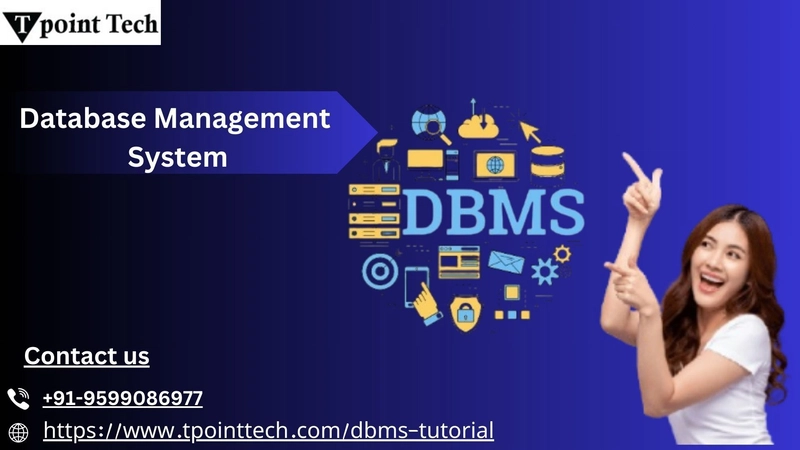In today’s digital world, data is one of the most valuable assets for businesses and individuals alike. Managing data efficiently is crucial for making informed decisions and ensuring smooth operations. This is where a Database Management System (DBMS) comes into play. A DBMS tutorial can help beginners understand how these systems work, their various types, key functions, and the benefits they offer.
What is a Database Management System?
A Database Management System (DBMS) is software that enables users to store, retrieve, update, and manage data in a structured manner. Instead of storing data in separate files, a DBMS organizes information in a way that makes it easy to access, manipulate, and maintain. Businesses, educational institutions, healthcare organizations, and many other industries rely on DBMS to handle large amounts of data efficiently.
Types of Database Management Systems
Different types of DBMS cater to various data management needs. Here are the most common types:
1. Hierarchical DBMS
- Stores data in a tree-like structure, where each record has a parent-child relationship.
- Commonly used in banking and telecommunications industries.
- Offers fast data retrieval but lacks flexibility in managing complex relationships.
2. Network DBMS
- Uses a graph-based structure, allowing multiple relationships between records.
- More flexible than hierarchical DBMS but can be complex to manage.
- Suitable for applications requiring complex data relationships, such as social networks.
3. Relational DBMS (RDBMS)
- The most widely used DBMS type, organizing data in tables with rows and columns.
- Supports SQL (Structured Query Language) for querying and managing data.
- Examples include MySQL, PostgreSQL, Oracle, and Microsoft SQL Server.
4. Object-Oriented DBMS (OODBMS)
- Stores data in objects similar to object-oriented programming.
- Ideal for applications that require complex data structures, such as multimedia databases.
- Provides better performance for certain use cases but is less common than RDBMS.
5. NoSQL DBMS
- Designed for handling unstructured and semi-structured data.
- Commonly used in big data, real-time applications, and distributed computing.
- Examples include MongoDB, Cassandra, and Redis.
Key Functions of a Database Management System
A DBMS tutorial would not be complete without understanding its core functions. Here are some of the essential roles a DBMS performs:
1. Data Storage and Retrieval
A DBMS allows users to store large volumes of data in an organized manner and retrieve it efficiently when needed. It ensures data is available for various applications and users.
2. Data Security and Integrity
Security is a critical function of any DBMS. It controls access through authentication and authorization, ensuring that only authorized users can view or modify data. It also maintains data integrity by preventing duplicate, inconsistent, or corrupt data.
3. Data Manipulation
Users can perform CRUD (Create, Read, Update, Delete) operations on data stored in the database. A DBMS provides interfaces such as SQL to manipulate data easily.
4. Backup and Recovery
A DBMS regularly creates backups to protect data from loss due to system failures, accidental deletions, or cyberattacks. It also offers recovery mechanisms to restore lost data.
5. Concurrency Control
Multiple users can access and modify the database simultaneously. A DBMS ensures that transactions are executed correctly without conflicts, maintaining data consistency.
6. Data Organization and Indexing
A DBMS structures data efficiently using indexing techniques, which improve search performance and query execution speed.
Benefits of Using a Database Management System
The use of a Database Management System offers numerous advantages:
1. Improved Data Accessibility
A DBMS provides a centralized system for storing and managing data, making it easy to access for authorized users. This enhances productivity and collaboration.
2. Enhanced Data Security
With built-in security features such as encryption, authentication, and access control, a DBMS protects sensitive data from unauthorized access and cyber threats.
3. Data Consistency and Accuracy
By enforcing rules and constraints, a DBMS ensures that data remains consistent, accurate, and up-to-date across all applications.
4. Efficient Data Management
A DBMS simplifies the process of handling large amounts of data, reducing redundancy and improving efficiency in storage and retrieval.
5. Scalability and Flexibility
Modern DBMS solutions can scale up or down based on the organization’s needs. Whether handling a small dataset or big data, a DBMS provides the flexibility required.
6. Cost Savings
By streamlining data management processes and reducing manual efforts, a DBMS helps organizations save costs associated with data handling and storage.
Conclusion
Understanding Database Management Systems (DBMS) is essential for anyone dealing with data management. Whether you are a beginner looking for a DBMS tutorial or an organization planning to implement a database solution, knowing the types, functions, and benefits of a DBMS can help in making informed decisions.
By choosing the right DBMS, businesses can efficiently manage their data, improve security, and enhance overall operational efficiency. As technology continues to evolve, the role of DBMS in data-driven applications will only become more significant.



Top comments (0)